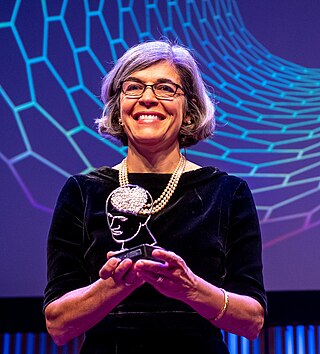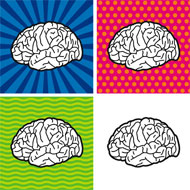
The Psychonomic Society is an international scientific society of over 4,500 scientists in the field of experimental psychology. The mission of the Psychonomic Society is to foster the science of cognition through the advancement and communication of basic research in experimental psychology and allied sciences. It is open to international researchers, and almost 40% of members are based outside of North America. Although open to all areas of experimental and cognitive psychology, its members typically study areas such as learning, memory, attention, motivation, perception, categorization, decision making, and psycholinguistics. Its name is taken from the word psychonomics, meaning "the science of the laws of the mind".

Margaret Ann Boden is a Research Professor of Cognitive Science in the Department of Informatics at the University of Sussex, where her work embraces the fields of artificial intelligence, psychology, philosophy, and cognitive and computer science.
John Robert Anderson is a Canadian-born American psychologist. He is currently professor of Psychology and Computer Science at Carnegie Mellon University.

Christopher Donald Frith FRS, FMedSci, FBA, FAAAS is a British psychologist and professor emeritus at the Wellcome Centre for Neuroimaging at University College London. He is also an affiliated research worker at the Interacting Minds Centre at Aarhus University, an honorary Research Fellow at the Institute of Philosophy and a Quondam Fellow of All Souls College, Oxford.

Dan Sperber is a French social and cognitive scientist and philosopher. His most influential work has been in the fields of cognitive anthropology, linguistic pragmatics, psychology of reasoning, and philosophy of the social sciences. He has developed: an approach to cultural evolution known as the epidemiology of representations or cultural attraction theory as part of a naturalistic reconceptualization of the social; relevance theory; the argumentative theory of reasoning. Sperber formerly Directeur de Recherche at the Centre National de la Recherche Scientifique is Professor in the Departments of Cognitive Science and of Philosophy at the Central European University in Budapest.

The Yale Graduate School of Arts and Sciences is the graduate school of Yale University. Founded in 1847, it is the oldest graduate school in North America, and was the first North American graduate school to confer a Doctor of Philosophy (Ph.D.) degree.

Paul Bloom is a Canadian American psychologist. He is the Brooks and Suzanne Ragen Professor Emeritus of psychology and cognitive science at Yale University and Professor of Psychology at the University of Toronto. His research explores how children and adults understand the physical and social world, with special focus on language, morality, religion, fiction, and art.

Patricia Goldman-Rakic was an American professor of neuroscience, neurology, psychiatry and psychology at Yale University School of Medicine. She pioneered multidisciplinary research of the prefrontal cortex and working memory.
The European Society for Philosophy and Psychology (ESPP) is a professional organization in Europe that promotes discussion and research at the intersection of philosophy, psychology and cognitive science. It is the European counterpart of the American Society for Philosophy and Psychology. The first joint conference of the two societies was held in Barcelona in 2004.

Anna Christina Nobre FBA, MAE, fNASc is a Brazilian and British cognitive neuroscientist working at Yale University in New Haven, CT, USA.
The study and teaching of philosophy in Canada date from the time of New France. Generally, Canadian philosophers have not developed unique forms of philosophical thought; rather, Canadian philosophers have reflected particular views of established European and later American schools of philosophical thought, be it Thomism, Objective Idealism, or Scottish Common Sense Realism. Since the mid-twentieth century the depth and scope of philosophical activity in Canada has increased dramatically. This article focuses on the evolution of epistemology, logic, the philosophy of mind, metaphysics, ethics and metaethics, and continental philosophy in Canada.
The Cognitive Science Society is a professional society for the interdisciplinary field of cognitive science. It brings together researchers from many fields who hold the common goal of understanding the nature of the human mind. The society promotes scientific interchange among researchers in disciplines comprising the field of cognitive science, including artificial intelligence, linguistics, anthropology, psychology, neuroscience, philosophy, and education. The Society is a member of the Federation of Associations in Behavioral & Brain Sciences.
Susan E. Carey is an American psychologist who is a Professor of Psychology at Harvard University. She studies language acquisition, children's development of concepts, conceptual changes over time, and the importance of executive functions. She has conducted experiments on infants, toddlers, adults, and non-human primates. Her books include Conceptual Change in Childhood (1985) and The Origin of Concepts (2009).
Sophie Haroutunian-Gordon is a published contributor to the field of Education. She is the Director of the Master of Science in Education Program at Northwestern University, where she is also a professor in the School of Education and Social Policy. She teaches with a focus in the philosophy of education, teacher education, interpretive discussion, and philosophy of psychology. Haroutunian-Gordon began teaching in the Glencoe area of Illinois - she taught sixth grade for five years. She left the faculty of the Department of Education at University of Chicago in 1991, and soon came to Northwestern University to direct the Master of Science in Education Program. Her published work ranges from psychology to the philosophy of education and teacher education. According to Northwestern University, "her second book, Turning the Soul: Teaching Through Conversation, received the American Education Studies Critics Choice Award in 1994. In 1996 she helped to form the Urban/Suburban-Northwestern Consortium of schools, which has received funding from the Joyce Foundation. Haroutunian-Gordon is immediate past president of the Philosophy of Education Society (2003–04)."

Tamar Szabó Gendler is an American philosopher. She is the Dean of the Faculty of Arts and Sciences at Yale as well as the Vincent J. Scully Professor of Philosophy and a Professor of Psychology and Cognitive Sciences at Yale University. Her academic research focuses on issues in philosophical psychology, epistemology, metaphysics, and areas related to philosophical methodology.
The Business History Conference (BHC) is an academic organization that supports all aspects of research, writing, and teaching about business history and about the environment in which businesses operate. Founded in 1954, the BHC supports ongoing research among its members and holds conferences to bring together business and economic historians. It also publishes a quarterly academic journal, Enterprise & Society, along with selected papers from its annual meetings via BEH On-Line.
Patricia W. Kitcher is the Roberta and William Campbell Professor of Philosophy at Columbia University, widely known for her work on Immanuel Kant and on philosophy of psychology. She has held many positions at different universities, is a founding chair of a committee at the University of California, and has a lead role in multiple professional organizations. Kitcher's most notable interests throughout her career regard cognition and Kantian ethics. She is the author of multiple papers and two books.
Laurie Renee Santos is an American cognitive scientist and professor of psychology at Yale University. She is the director of Yale's Comparative Cognition Laboratory, Director of Yale's Canine Cognition Lab, and former Head of Yale's Silliman College. She has been a featured TED speaker and has been listed in Popular Science as one of their "Brilliant Ten" young scientists in 2007 as well as in Time magazine as a "Leading Campus Celebrity" in 2013.
The European Society for Cognitive Psychology (ESCoP) is one of the primary societies for scientific psychology in Europe. Members of ESCoP specialize in research in Cognitive Psychology and related disciplines, studying topics such as working memory, attention, language processing, bilingualism, perception, and many more. ESCoP was an associate member of the European Federation of Psychologists' Associations (EFPA), and organized joint symposia with the Association for Psychological Science (APS).

Aikaterini Fotopoulou is a psychologist and cognitive neuroscientist who is a professor at the University College London Research Department of Clinical, Educational and Health Psychology. She is the co-founder and Treasurer of the International Association for the Study of Affective Touch and the President-Elect of the European Cognitive and Affective Neuroscience Society. She is also a Fellow of the Association for Psychological Science and past co-chair of its International Convention, and the past President of the Psychology Section of the British Science Association. Fotopoulou was the past Director of the London Neuropsychoanalysis Centre, Secretary of the International Neuropsychoanalysis Society and coordinator of the London Neuropsychoanalysis Group.










